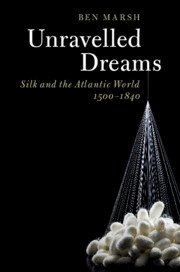Book contents
- Unravelled Dreams
- Unravelled Dreams
- Copyright page
- Dedication
- Contents
- Colour Plates
- Figures
- Maps
- Tables
- Acknowledgements
- 1 Prologue
- Part I Emergence
- Part II Persistence
- Part III Convergence
- 8 Convergence
- 9 Pennsylvania and Sericultural Revolution
- 10 Silk Production in the Wake of Revolution
- 11 Epilogue
- Select Bibliography
- Index
- Plate Section (PDF Only)
11 - Epilogue
from Part III - Convergence
Published online by Cambridge University Press: 08 October 2020
- Unravelled Dreams
- Unravelled Dreams
- Copyright page
- Dedication
- Contents
- Colour Plates
- Figures
- Maps
- Tables
- Acknowledgements
- 1 Prologue
- Part I Emergence
- Part II Persistence
- Part III Convergence
- 8 Convergence
- 9 Pennsylvania and Sericultural Revolution
- 10 Silk Production in the Wake of Revolution
- 11 Epilogue
- Select Bibliography
- Index
- Plate Section (PDF Only)
Summary
The raising of raw silk in the United States at the start of the nineteenth century was a local phenomenon that remained concentrated in areas that had a colonial legacy. In the context of a fast-diversifying economy and the meteoric rise of cotton occurring in the South, it gave little hint of being a branch of agriculture that had the potential to survive in the expanding United States. But sericulture experienced a nationwide rejuvenation between 1820 and 1845, as pockets of cultivation developed across the nation, from Maine to Louisiana. Most of these efforts raised small quantities which tended to be reeled locally and inexpertly, and twisted into sewing thread, though they could hold great value and meaning to individuals and households. The chapter argues that three mutually reinforcing vehicles gave particular shape to these antebellum efforts at silk production: the agricultural press, the postal service, and the agricultural society. These packaged up a nationalist rhetoric that virtuously reconciled agriculture with manufacturing, production with consumption, and progress with nostalgia. But in spite of innovative justifications and wide uptake, many of the self-same issues that had compromised earlier efforts at sericulture eventually rose to the surface. The challenge of making silk American had been accomplished, but not that of making American silk.
Keywords
- Type
- Chapter
- Information
- Unravelled DreamsSilk and the Atlantic World, 1500–1840, pp. 425 - 457Publisher: Cambridge University PressPrint publication year: 2020

